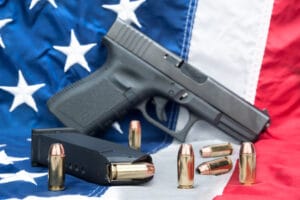An individual’s Second Amendment1 right to keep and bear arms becomes all the more important in these troubling times. As people in Indiana (and nationally) flocked to their local firearms dealer or a gun shop to buy a gun in the face of uncertainty with the COVID-19 global pandemic, many individuals were “denied” the purchase by a NICS2 background check. Is this your situation? If you didn’t expect it, you probably have many questions swirling around in your head, such as “how is this possible? what does this mean? what can I do to fix it?” In this blog, we provide some common reasons why you may have been denied the purchase of a firearm, which with skilled counsel may be corrected.
First, individuals with a common name, such as “John Smith”, may be “delayed” when they initially go to purchase a firearm. The most likely reason for this delay in this type of situation is simply due to the commonality of the name. Individuals with common names may receive a delayed message, but in those instances, it is typically corrected after more information is gathered by the FBI (who handles the NICS’ system). However, even in situations where an individual is mistaken for another who is prohibited from owning a firearm, it may not be resolved on its own. Instead, that delay message may result in a denial, which will require further attention from you, by counsel.
Second, for those of you who have received a “denial,” there could, unfortunately, be a multitude of reasons for this denial that you may not have thought about or believed were corrected. For example, as noted, it could be a case of mistaken identity. Some of the most common reasons for a NICS’ denial include:
- A prior criminal conviction that was not reduced to a misdemeanor as contemplated, or it was, but this was not captured by the appropriate criminal database;
- Previous, defective expungement;
- Expungement under statutes not recognized by the federal government at the time of the expungement;
- Lack of restoration of firearms’ rights in domestic violence cases; or
- A felony that needs to be expunged if it is allowed by statute (most felonies can be expunged after the passage of a certain amount of time).
In many instances, an individual may not have known they were prohibited from owning a firearm, or maybe thought they already successfully expunged the conviction or otherwise addressed the matter. But, for whatever the reason, their Second Amendment rights are actually not intact or there is a mistake causing you to be wrongfully denied. However, there is hope. There are several different remedies a skilled counsel can use to pursue your matter to ensure your Second Amendment right is restored. Dixon & Moseley, P.C. have assisted with thousands of gun cases of one type or another. Don’t lose hope.
Firearm cases are complex because there are thousands of local, state, and federal laws, rules and regulations, as well as cases, they may have to be considered to successfully address a NICS’ denial. They often times turn on extremely fact-sensitive scenarios, making a generalized remedy nearly impossible to provide. Having a skilled attorney who is experienced in the firearm’s law is critical. Even improper expungements can often be corrected. The attorneys at Dixon & Moseley, P.C. are active in all aspects of firearms law ranging from representing manufacturers to helping individuals secure and restore their Second Amendment rights. This blog is written for general educational purposes. It is not intended as legal advice, nor a solicitation for services. It is advertising material.
- This right is found in Article 1, Section 32 of the Indiana Constitution.
- This acronym stands for National Instant Criminal Background Check System.






